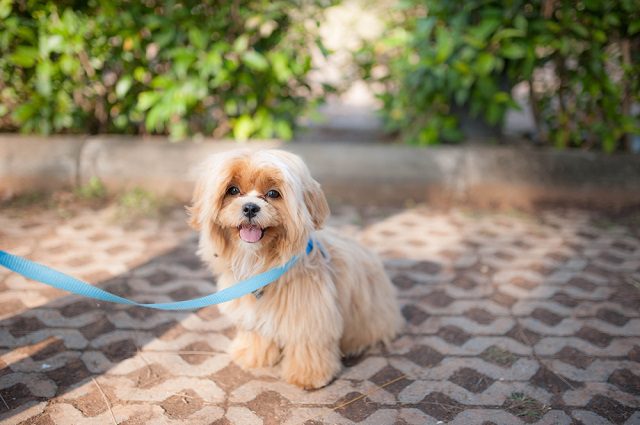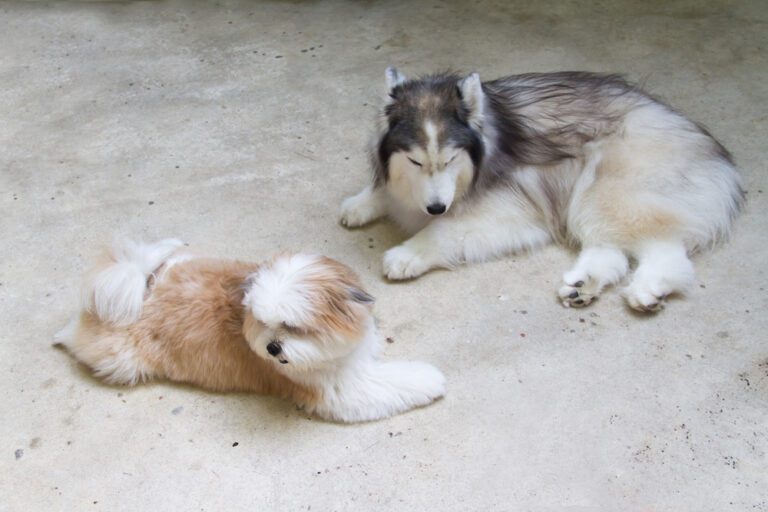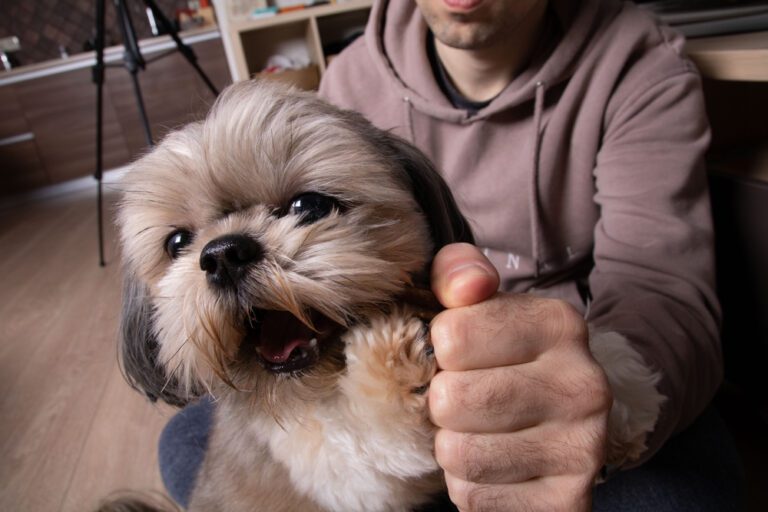Shih Tzu Yawns: What Does Your Dog’s Yawning Mean?
Have you ever noticed your Shih Tzu yawns after a long day of playing and wondered what it meant? While it may seem like a natural reaction, yawning in dogs can communicate various messages. This article will delve into the hidden language of Shih Tzu yawns and decipher what your dog’s yawning means.
Yawning in dogs is often associated with different emotions and behaviors. It can signify tiredness or relaxation, indicating that your furry friend needs a rest. However, yawning can also indicate stress, anxiety, or even fear. Understanding the context and accompanying body language is vital to deciphering the true meaning behind your Shih Tzu’s yawns.
Recognizing subtle cues and patterns can give you deeper insight into your dog’s emotions and well-being. This knowledge can help you address any underlying issues and ensure a happier and healthier life for your beloved Shih Tzu.
So, let’s unlock the hidden language of Shih Tzu yawns together and discover what your dog’s yawning is trying to tell you.
Understanding the behavior of dogs
Dogs are known for their ability to communicate with us using a combination of body language, vocalizations, and behaviors. Yawning is one such behavior that can provide valuable insights into a dog’s emotional state. While it is commonly associated with tiredness, there is often more to it than meets the eye.
Dogs have complex social structures and rely heavily on non-verbal cues to communicate with each other and with humans. Yawning is just one of the many ways they express themselves. You can better understand their needs and emotions by understanding and interpreting your Shih Tzu’s yawns, strengthening your bond.

Yawning in dogs: Is it just a sign of tiredness?
Yawning in dogs is often perceived as a sign of fatigue or relaxation. Just like humans, dogs tend to yawn when they are tired or in need of rest. However, it is essential to note that dogs’ yawning can have other meanings. It can be a way for them to cope with stress or anxiety or even a way to communicate fear or discomfort.
To accurately interpret your Shih Tzu’s yawns, it is crucial to consider the context in which they occur. Yawning may be a natural response to fatigue if your dog has been playing or engaging in physical activity. On the other hand, if your dog yawns in unfamiliar or tense situations, it may indicate stress or anxiety.
The hidden language of Shih Tzu yawns
While yawning in dogs can have multiple interpretations, it is essential to understand that the meaning may vary depending on the individual dog and the specific situation. Like any other breed, Shih Tzus have unique ways of communicating through yawns. Observing their body language and considering the context, you can decipher the hidden language of your Shih Tzu’s yawns.
One crucial aspect to consider is the presence of other accompanying behaviors. Does your Shih Tzu yawn while showing signs of tension, such as a stiff body posture or dilated pupils? This could indicate that your dog is feeling anxious or stressed. Conversely, if your Shih Tzu yawns relaxed and calm, it may simply be a response to tiredness.
What different types of yawns in dogs indicate
Yawns in dogs can come in different forms and intensities, each potentially carrying its meaning. Pay attention to these variations to better understand what your Shih Tzu is trying to communicate. Here are some common types of yawns in dogs and their possible interpretations:
The quick yawn
This brief and subtle yawn is often seen in relaxed situations. It can indicate contentment and a general state of calmness. If your Shih Tzu yawns this way, they will likely feel at ease.
The exaggerated yawn
This type of yawn is characterized by a wide opening of the mouth and a longer duration. It is often seen when your Shih Tzu may feel stressed, anxious, or uncomfortable. Pay attention to other signs of tension to accurately interpret this type of yawn.
The contagious yawn
Dogs, like humans, can yawn in response to seeing others yawn. This contagious behavior is thought to be a form of empathy and social bonding. If your Shih Tzu yawns after seeing you or another dog yawn, it signifies their emotional connection with you or their canine companion.
The fake yawn
Some dogs may exhibit fake yawns to seek attention or manipulate their owners. This behavior is often accompanied by other attention-seeking actions, such as nudging or pawing. If your Shih Tzu repeatedly yawns this way, it may be a sign that they are trying to communicate a specific need or desire.

Yawning is a form of communication between dogs and humans
Yawning is not only a way for dogs to communicate with each other, but it can also be a form of communication between dogs and humans. Dogs are highly attuned to our emotions and can pick up on subtle cues in our body language. When they yawn in response to our yawns, it can signify empathy and a desire to connect with us.
If your Shih Tzu yawns after you yawn, they pay attention to your emotional state and try to establish a bond. This behavior is ubiquitous in dogs with a solid attachment to their owners. By reciprocating the yawn or reassuring them, you can strengthen your bond and create a sense of trust.
Factors that could affect a dog’s yawning behavior
Several factors can influence a dog’s yawning behavior, making it essential to consider the broader context when interpreting their yawns. Here are some common factors that can affect how and why your Shih Tzu yawns:
Fatigue
Yawning is a natural response to tiredness, so if your Shih Tzu has been engaging in physical activity or simply needs rest, yawning may be a way to communicate their need for sleep.
Stress and anxiety
Dogs can yawn when feeling stressed or anxious. This can be triggered by various factors such as loud noises, unfamiliar environments, or separation from their owners. Yawning in these situations often accompanies other signs of tension, such as pacing or panting.
Social cues
Dogs are highly social animals, and yawning can serve as a way to communicate with other dogs or humans. Contagious yawning, for example, is a way for dogs to show empathy and bond with their canine or human companions.
Health issues
In some cases, excessive yawning can indicate an underlying health issue. Suppose your Shih Tzu is yawning excessively, in combination with other concerning symptoms such as lethargy or loss of appetite. In that case, it is essential to consult a veterinarian to rule out any medical conditions.
Interpreting your Shih Tzu’s yawns
To accurately interpret your Shih Tzu’s yawns, looking for specific signs and considering the overall context is essential. Here are some common meanings associated with Shih Tzu yawns and signs to look for:
Relaxation
If your Shih Tzu yawns in a calm and relaxed manner, with no signs of tension or stress, they are likely tired and need rest.
Stress or anxiety
Yawning, accompanied by other signs of tension, such as a stiff body posture or dilated pupils, can indicate that your Shih Tzu is stressed or anxious. This could be due to various factors, such as a loud environment or unfamiliar surroundings.
Empathy and connection:
If your Shih Tzu yawns after seeing you yawn or another dog yawn is a sign of their emotional connection with you or their canine companion. This contagious behavior allows them to show empathy and establish a bond.
Attention-seeking
Some dogs may use fake yawns to seek attention or manipulate their owners. If your Shih Tzu repeatedly yawns in this manner, it is essential to identify any underlying needs or desires they may be trying to communicate.

How to respond to your dog’s yawns and strengthen your bond
Now that you better understand what your Shih Tzu’s yawns might mean, knowing how to respond to improve your bond and promote their well-being is essential. Here are some tips to consider:
Provide relaxation
If your Shih Tzu yawns after a long day of play or physical activity, ensure they have a quiet and comfortable resting space. This will help them recharge and prevent any potential stress or fatigue.
Create a calm environment
If your Shih Tzu yawns in response to stressful situations, such as loud noises or unfamiliar environments, try to create a calm and safe space for them. This can involve using white noise machines, playing soothing music, or calming pheromone diffusers.
Offer reassurance
When your Shih Tzu yawns in response to your yawns, reciprocate the yawn and offer them gentle reassurance. This will help strengthen your bond and create a sense of trust and security.
Address underlying needs
If your Shih Tzu repeatedly uses fake yawns to seek attention, addressing any underlying needs or desires is essential. Ensure they are getting enough mental and physical stimulation, and provide them with appropriate outlets for their energy.
Tips for reducing stress and boredom in Shih Tzus
To promote overall well-being and reduce stress in your Shih Tzu, consider implementing the following tips:
Regular exercise
Give your Shih Tzu regular exercise to help burn off excess energy and stimulate them physically and mentally. This may involve regular walks, play sessions, or engagement with interactive toys.
Mental stimulation
Engage your Shih Tzu’s mind with puzzle toys, treat-dispensing toys, or training sessions. Mental stimulation can help prevent boredom and reduce stress.
Establish a routine
Dogs flourish with routine, so create a steady schedule for feeding, exercise, and rest. This will provide them with a sense of security and predictability.
Positive reinforcement
Use positive reinforcement techniques, such as treats and praise, to reward your Shih Tzu for good behavior. This will help build their confidence and strengthen your bond.
Conclusion
Yawning in Shih Tzus, and dogs in general is a form of communication that can reveal valuable insights into their emotional state and well-being. By paying attention to the context, accompanying behaviors, and different types of yawns, you can decipher the hidden language of your Shih Tzu’s yawns and respond accordingly.
Remember, yawning in dogs can indicate fatigue, stress, anxiety, or even a desire to connect with you. You can deepen your bond and ensure a happier and healthier life for your beloved Shih Tzu by providing them with rest and reassurance and addressing their underlying needs. So, the next time you see your furry friend yawning, take a moment to listen to what they might be trying to tell you.







